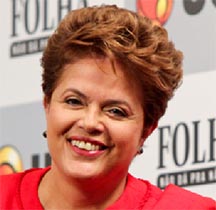RIO DE JANEIRO, (Reuters) – Brazil’s October presidential race has been shaken up by a corruption scandal allegedly involving state-run oil firm Petrobras and dozens of lawmakers, with both leading candidates forced onto the defensive after colleagues were implicated.

Media reported on Friday night that a jailed former Petrobras director had named dozens of politicians who allegedly received kickbacks off the company’s contracts.
The revelations are a headache for President Dilma Rousseff, undermining her reputation for zero tolerance on corruption just as she is slipping in the polls ahead of the Oct. 5 election.
It could also hamper opposition candidate Marina Silva.
But the scandal has given third-placed Aecio Neves a fresh rallying call as he tries to claw himself back into the race.
He is already on the offensive, branding the scandal “mensalao 2” in reference to the “mensalao” vote-buying scheme in Congress that tainted former president Luiz Inacio Lula da Silva while he was in office.
On Saturday, the magazine Veja printed the names of those implicated in the scandal. Among them were former governor and presidential candidate Eduardo Campos, who died in a plane crash last month; minister for energy and mines Edison Lobao; president of Congress’ lower house Henrique Eduardo Alves; and Senate president Renan Calheiros.
Those allegedly involved in the scheme were said to have received a 3 percent kickback off the oil firm’s contracts with third parties between 2004 and 2012. The money swapped hands in order to maintain political support between parties, Veja said.
The names were given by Paulo Roberto Costa, former head of Petrobras’ refining and supply unit, arrested in March as part of a police investigation into money laundering.
Rousseff has always stressed her credentials as a no-nonsense manager, with development of Brazil’s oil riches an important part of that image.
She spoke to reporters in Sao Paulo on Saturday.
“I assure you I will take the necessary action. But I will not act based on speculation, I want the details,” she said.
Expectations that the scandal would further boost opposition candidate Marina Silva are countered by the alleged involvement of Campos in the scheme.
Silva – Campos’ deputy before he died in a plane crash – has spent her life campaigning against precisely the type of corruption outlined in the media reports.
Support for Silva has surged in polls in recent weeks, and she is now seen winning a second round runoff, helped by a mix of national grief over Campos’ death and her promise of a new type of principled politics.
A statement from the president of the late Campos’ PSB party, Roberto Amaral, described the allegations as a “perverse scheme” to tarnish Campos’ image. “There is no charge here worthy of honest consideration. There is only malice.”
The one mainstream candidate not directly implicated in the scandal, Aecio Neves – currently running third in the polls – was quick to go on the offensive.
“Brazil woke up confused this morning to one of the worst allegations of corruption in our recent history,” Neves said in a video posted on the internet.
Alves, the head of congress, issued a statement denying receiving funds from Costa. Press aides for Lobao and Renan said they had no position yet on the issue, while officials at Petrobras were not immediately available for comment.




